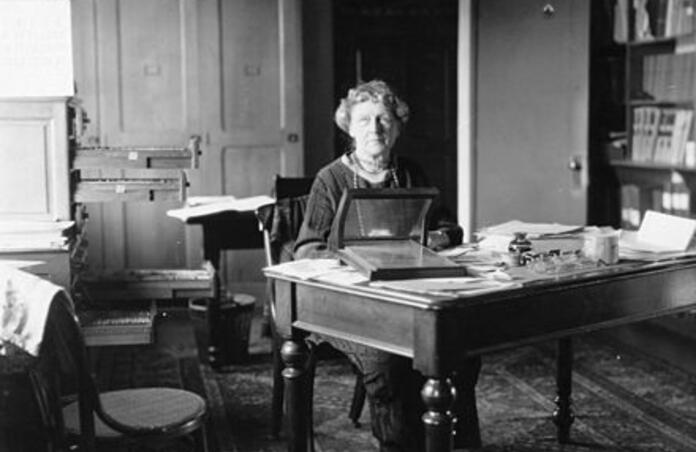Annie Jump Cannon

This week is the 160th birthday for American astronomer Annie Jump Cannon [1863-1941]. She studied physics under the equally famous Sarah Frances Whiting [1847-1927], at Wellesley College, receiving her bachelor's degree in 1884.
After traveling in Europe, Cannon could not find a job, and wrote to Whiting asking for help. Whiting put Cannon in touch with Edward Pickering [1846-1919] at Harvard College Observatory. Pickering hired Cannon in 1896, and she finished her master's degree from Wellesley College in 1907. Pickering had hired Cannon into a group of women now known to history as the Harvard Computers.
Beginning in 1901, Annie Cannon developed the Harvard system for the spectral classification of stars, which remains the standard system used today. She modified a system previously developed by Antonia Maury [1866-1952] in 1897, who had greatly modified the original system developed by Jesuit Priest Pietro Secchi [1818-1878] in the 1850s & 1870s.
Cannon classified stellar spectra by looking at a glass photographic plate with a small magnifying glass. In that way, she was eventually able to classify spectra at the rate of 3 per minute, eventually reaching a personal total of about 500,000 spectra. That is more than any other person, and a record likely to stand forever, since spectral classification is now done entirely by computer.
The Harvard Computers (colloquially & contemporaneously known as “Pickering's Harem”) were all women, and aside from Cannon, also includes Henrietta Swan Leavitt [1868-1921]. In 1908-1912, she discovered the period-luminosity relationship for cepheid variable stars, used by both Harlow Shapley [1885-1972] & Edwin Hubble [1889-1953] in their pioneering discovery of the Galaxy, and the universe beyond, during the first 3 decades of the 1900s, at Mount Wilson Observatory. And Cecilia Payne-Gaposchkin [1900-1979], another Harvard Computer, worked with Cannon, and used her spectral data as part of her own proof that stars are made mostly of hydrogen & helium (in her 1925 doctoral thesis).
Although virtually unknown outside the astronomical community, the Harvard Computers are responsible for discoveries that lay the foundation for the modern astronomical sciences. The story of the Harvard Computers is told comprehensively, for the first time, in the book “The Glass Universe” by Dava Sobel (2016), who is well known for her excellent writing on the history of science, and this book is no exception. If you want to know about the Harvard Computers, and their exceptional place in the history of women in science, this is the book for you.
Sources:
https://en.wikipedia.org/wiki/Annie_Jump_Cannon (Wikipedia)
https://www.sdsc.edu/ScienceWomen/cannon.html (San Diego Supercomputer Center)
https://www.britannica.com/biography/Annie-Jump-Cannon (Encyclopedia Britannica)
https://www.amphilsoc.org/blog/annie-jump-cannon (Biography - Marian Christ, American Philosophical Society, 16 January 2022)
https://scientificwomen.net/women/cannon-annie-24 (History of Scientific Women)
http://academics.wellesley.edu/Astronomy/Annie/index.html (Biography - Wellesley Women in Science, Wellesley College)
https://ui.adsabs.harvard.edu/.../1941PASP...53.../abstract (Obituary - Priscilla Fox, Publications of the Astronomical Society pf the Pacific 53(313): 168-170, June 1941)
https://hollisarchives.lib.harvard.edu/.../4/resources/4134 (Papers of Annie Jump Cannon - Harvard University Library)
https://www.womenshistory.org/.../biogr.../annie-jump-cannon (National Women’s History Museum)
https://princetonastronomy.com/.../annie-jump-cannon-and.../ (“Annie Jump Cannon and the Creation of Stellar Classification” - Athena Basu, Sidereal Times, Princeton University, 1 February 2021)
https://www.lindahall.org/.../scientis.../annie-jump-cannon/ (Linda Hall Library, Scientist of the Day, 11 December 2015)
https://aas.org/grants.../annie-jump-cannon-award-astronomy (Annie Jump Cannon Award - American Astronomical Society)
https://www.aps.org/publications/apsnews/202004/history.cfm (“April 13, 1942: Death of Annie Jump Cannon” - American Physical Society, April 2020)
https://en.wikipedia.org/wiki/Stellar_classification... (Harvard spectral classifications - Wikipedia)
https://en.wikipedia.org/wiki/Harvard_Computers (Harvard Computers - Wikipedia)
https://www.npr.org/.../women-astronomers-shine-in-the... (Book Review: The Glass Universe - NPR)
https://www.davasobel.com/books-by.../the-glass-universe (The Glass Universe - Dava Sobel)
Reposted from Tim Thompson, Retired Chief Astronomer, NASA JPL
